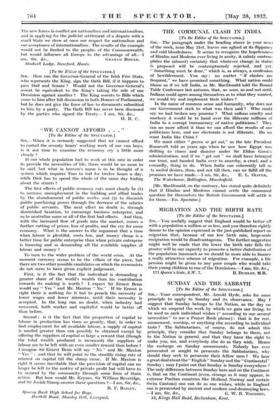"WE CANNOT AFFORD , . "
[To the Editor of the SPECTATOR.] Sin,-- When it is seriously suggested that we cannot afford to curtail the seventy hours' working week of our van boys, is it not time to examine the economy cry a little more closely ?
If our whole population had to work at this rate in order to provide the necessities of life, there would be no more to be said, but what in heaven's name is to be thought of a system which requires Tom to toil for twelve hours a day, while Dick has to spend the whole of the same day loafing about the streets ?
The first effects of public economy cuts must clearly be (1) to increase unemployment in the building and allied trades by the abandonment of public works, and (2) to diminish public purchasing power through the decrease of the salaries of public servants. The next effect no doubt is, through diminished taxation, to encourage business enterprise, and so to neutralize some or all of the first bad effects. And then, with the increased flow of goods into the market, comes a further cutting of prices, loss of profits, and the cry for more economy. What is the answer to the argument that a time when labour is plentiful, costs low, and money cheap is a better time for public enterprise than when private enterprise is booming and so demanding all the available supplies of labour and money ?
To turn to the wider problem of the world crisis. At the moment currency seems to be the villain of the piece, but there are two other possible candidates on which the economists do not seem to have given explicit judgement.
First, is it the fact that the individual is demanding a greater share of the world's wealth than his contribution towards its making is worth ? I expect Sir Ernest Henn would say " Yes " and Mr. Maxton " No." If Sir Ernest is right there is nothing for it but to preach the necessity of lower wages and lower interests, until their necessity is accepted. In the long run no doubt, when industry had recovered, both worker and capitalist would be better off than before.
Second ; is it the fact that the proportion of capital to labour in production has risen so greatly, that, in order to find employment for all available labour, a supply of capital is needed greater than can possibly be obtained except by offering the suppliers of capital so large a reward that (though the total wealth produced is increased) the suppliers of labour are to be left with an even smaller reward than before ?
I imagine Sir Ernest Bean will say " " and Mr. Maxton " Yes " : and that he will point to the steadily rising rate of interest on capital till the slump came. If Mr. Maxton is right it seems inevitable that the provision of capital can no longer be left to the motive of private profit but will have to be secured by the community through some form of State action. But how would Mr. Keynes, Sir William Beveridge, and Sir Josiah Stamp answer these questions ?—I am, Sir, &c., R. F. BAILEY, Quarry Bank High School for Boys, Ilarthill Road, Mossley llill, Liverpool.








































 Previous page
Previous page